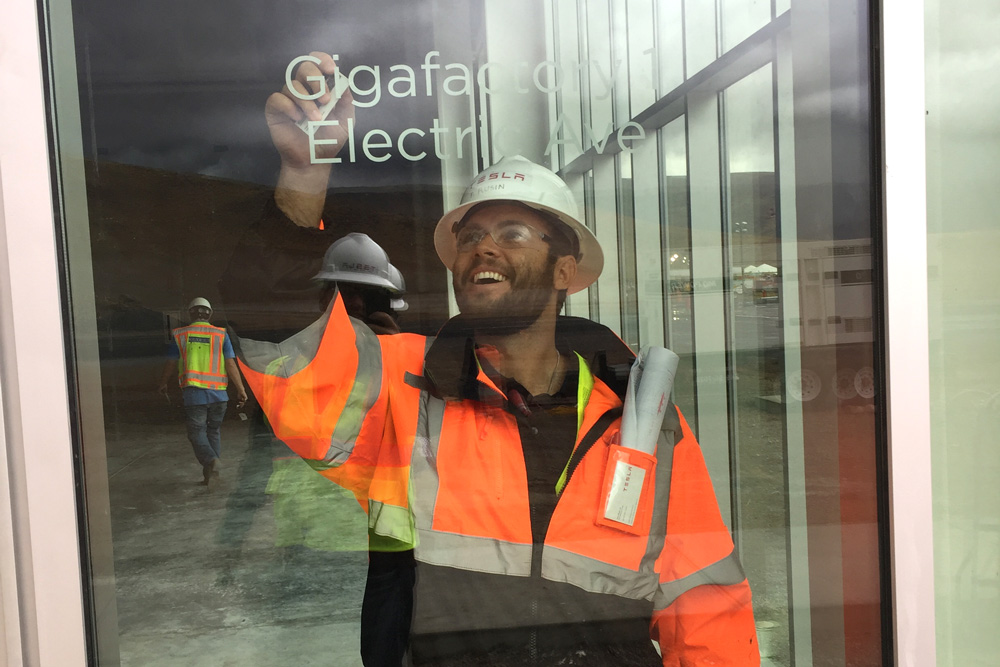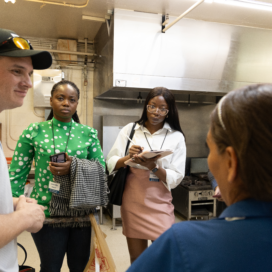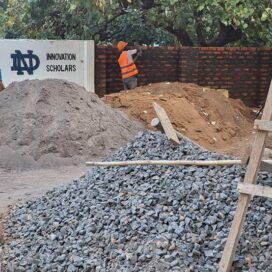Mendoza alum accelerates career at Tesla
Published: January 18, 2022 / Author: Melissa M. Jones and Brandi Wampler

Pete Rusin
It was the mission to accelerate the world’s transition to sustainable energy that attracted Pete Rusin Jr. (EMBA ’20) to work for Tesla. And it was ultimately his desire to better understand the new world he was working in that inspired him to join the University of Notre Dame Executive MBA program.
Rusin is a manager for Tesla’s Commercial Energy Asset Management division. He came into the position not from a high-tech background, but from architecture, serving in his previous roles as a technical program manager helping to design and construct Tesla’s Gigafactories around the world.
“When people think of architects, they think of it as purely technical,” said Rusin. “But since joining Tesla in 2014, a lot of what I was spending my time on was not just doing the design. It was, ‘Why are decisions coming down to us?’ I just felt like I needed to be able to speak that language.”
That language was business acumen, and it was something he felt was missing from his professional portfolio. At this point, Rusin had about 15 years of work experience under his belt, with his last four years at Tesla. He had earned a bachelor’s degree in design management from Arizona State University and a certificate of executive management from the Mendoza College of Business.
In describing that initial Notre Dame experience, Rusin said, “As a technical professional, the certificate program was a chance to dip my toes in the water to the business side of things and I got hooked. And from there it was sort of Notre Dame or nothing.”
The Executive MBA program provided an opportunity for Rusin to grow as a leader. He explained that the EMBA program not only made him aware of the type of leader he was, but what steps he could take to become the type of leader he wanted to be.
“The skills that I learned through the University were very much from a leadership perspective,” said Rusin. “Going through the EMBA, that was huge for me. Developing from a transactional leader to a more relational leader was something that I focused on.”
Rusin has been putting his EMBA to work in multiple roles within Tesla’s energy organization. And those new roles have allowed him to step out of the technical world he had been a part of early in his career while also filling a need.
Now, Rusin leads a team of asset managers responsible for commercial solar and industrial battery storage assets at more than 3,000 global sites. Here, he leads ways to shift critical thinking to help others understand what’s both economically viable and efficient for a sustainable future. This is supported by his (and Tesla’s) first principles mindset – which basically sets the laws of physics as the boundary of what’s possible or not.
“That [mindset] is something that is super powerful and changes the way you think about the world from on a day-to-day basis,” said Rusin. “I think too many times people will put up artificial barriers for themselves when they are challenged, and they sort of rationalize through analogy instead of building from the ground up.”
Being able to build from the ground up and critical thinking are important components for success, said Rusin. This is why he made sure these were both aspects ingrained in the student’s work when he worked with Notre Dame’s School of Architecture in 2018 to create a limited-time course.
The class was open to engineering and architecture students in an effort to create a more realistic atmosphere that emulate the workforce, where architects and engineers who often think differently have to work together to solve a problem. The coursework taught students the importance of communication and coexistence while building a proposal from the ground up with real data.
“It didn’t matter what the proposal was because that wasn’t important,” he said. “What was important was that a proposal clearly demonstrated that decisions or concepts were rooted in what the student discovered firsthand in the data.”
Rusin hopes he can continue to have an impact on others and encourages people to measure their success by how much they enjoy what they do and by their own impact.
“It could be your family level, community level, or world level – it doesn’t matter. What does is that … you’re having an impact on something other than yourself.”




